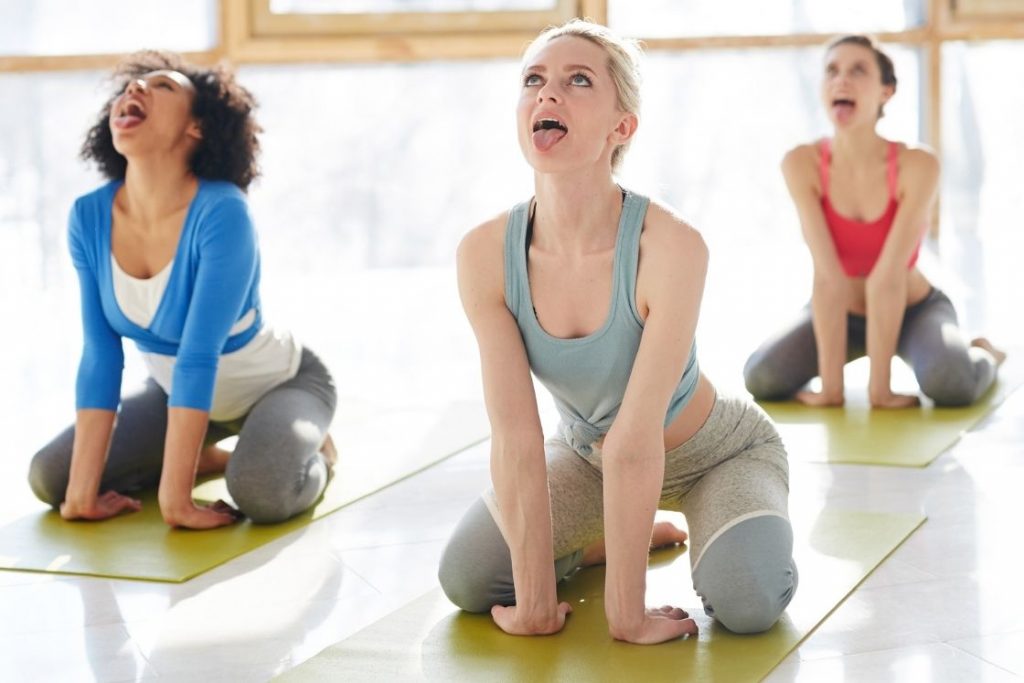
Lion’s breath is generally practised when you are performing Simhasana or Lion’s Pose. but you can also perform the breathing part as a stand-alone practice.
Also known as Simha pranayama in Sanskrit, Lion’s breath is a powerful breathing exercise that can help you calm your mind, give you confidence, and improve your vocal cords.
In Lion’s breath, by opening your mouth wide and putting your tongue out, you stretch your jaw, neck, and face muscles. The sound you make during exhalation is just like a lion’s roar, deep from the belly.
It helps you let go of any frustrations and anger. If you are getting overheated, try this breath to blow off some steam.
Read on to learn more about how to do lion’s breath and its benefits.
How to Do Lion’s Breath
There are various alternatives for the sitting position to perform lion’s breath. Many prefer to sit in a Thunderbolt Pose (Vajrasana) or Hero Pose (Virasana) as it is said to replicate the lion’s pose. However, if you are not comfortable sitting on your knees, you can also sit in Easy Pose (Sukhasana) or Lotus Pose (Padmasana).
Another option is for where to gaze (Drishti) in Lion’s breath. The most common recommendation is to gaze at the third eye chakra. If you have trouble focusing your gaze there, you can focus on the tip of your nose or upwards towards the ceiling or sky.
Let us see the steps of performing lion’s breath.
- Sit in a comfortable seated pose of your choice.
- Keep your hands on the knees or thighs, with fingers spread apart, and lean forward slightly. You also have the option of keeping your hands on the floor for better grip and posture.
- Inhale deeply through the nose.
- Exhale forcefully with your mouth wide. Get your tongue out and stretch the tongue towards the chin.
- Your exhale should make a “ha” sound. The sound comes deep from your throat and the abdomen.
- Close your mouth and breath normally from your nostrils. Then exhale in the same manner.
- Repeat this process 5-7 times. If you want, you can switch the position of your legs and proceed with the practice.
- When you have finished practicing, close your mouth and breath deeply for 3 minutes.
You can practice the lion’s breathing technique before starting your yoga session or at the end. It is a simple breathing exercise that will help you strengthen your throat and neck muscles from inside out, improve your respiratory system and remove toxins from your mind and body.
Precautions
Lion’s breath shouldn’t be practised by people who suffer from respiratory issues. Forced exhalation can create a risk of trauma to the airways.
People with injury, pain, surgery or medical conditions like arthritis to the knee can avoid seated kneeling posture. They can also use a chair or a cushion for your knees for extra support.
Benefits of Lion’s Breath
It may seem that mere making a sound or putting your tongue out is ridiculous, but the lion’s breath comes with a wide range of benefits for your face, throat, and mind. It even stimulates your energetic plane and removes blockages from it.
Here are some of the benefits of practising lion’s breath.
- When you open your mouth in lion’s breath, it stretches the muscles of the face and neck. This stretching, which is not done often, relieves tension and stress in the muscles.
- It also encourages circulation to the face and neck by actively engaging the nerves and muscles.
- Lion’s breath is an ideal warm-up for singers as it massages and stimulates the vocal cords. People with speech impediments such as stutter can also benefit from it.
- This breathing technique is useful in engaging your lungs and diaphragm, thus improving their strength.
- You can also use this to warm up before starting your yoga sessions as it builds internal heat.
- The lion’s breath directly stimulates the throat chakra. It improves our communication, enhances self-expression, gives us the confidence to voice our opinions.
- One of the overlooked benefit of lion’s breath is the stimulation of platysma, a thin, flat, triangular-shaped muscle in front of the throat. If loose, it can cause wrinkles around the mouth and neck. Lion’s breath can make this muscle firm.
- This breathing exercise also makes you calm by reducing negative thoughts and emotions. It also promotes mental clarity.
- It is an empowering breathing technique that gives you mental strength, confidence, higher self-esteem, and courage to face difficult situations.
What science says?
The evidence, though not substantial, is enough to prove that the lion’s breath is indeed one of the ways through which you can reduce symptoms of certain diseases and maintain a healthy mind and body.
A 2016 study [efn_note] Effects of multisensory yoga on behavior in a male child with Apert and Asperger syndrome https://www.ncbi.nlm.nih.gov/pmc/articles/PMC4728965/ [/efn_note] shows multisensory enriched yoga exercise (such as Lion’s breath) have a positive impact on a 7-year old boy’s (with Apert and Asperger’s syndrome) behaviors related to physical, social, and emotional well-being.
In this study, the boy with Apert and Asperger’s syndrome attended 8, 45 min multisensory yoga sessions (including lion’s breath), twice a week, during a 4-week camp. These sessions had a positive impact on expressive emotions, social engagement, ability to self-regulate stress.
Pranayama, in general, has been proven to reduce symptoms of chronic obstructive pulmonary disease (COPD), asthma [efn_note] Asthma – A Disease of How We Breathe: Role of Breathing Exercises and Pranayam https://link.springer.com/article/10.1007/s12098-017-2519-6 [/efn_note], among other health problems.
Conclusion
This breathing exercise is super energizing and revitalizing. It will give you the courage and confidence of a lion, be a healthy tool to vent out your anger and frustration, and open your throat for better communication. If you set an intention of letting out your negativity, lion’s breath will be a wonderful gateway to remove the mental toxins and invite positivity in your life.




